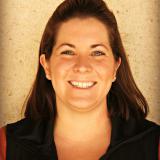Ms. Julie Fogarty

NSF Graduate Research Fellow @ Stanford University
I am a graduate student at Stanford University. This means I spend 85% of my time doing academic research and the other 15% of my time taking graduate level classes and TAing for undergraduate courses. Specifically, I am working with Prof. James R. Swartz on developing and improving vaccines for HIV and influenza. Most people hate shots, and getting a new flu shot every year is a major deterrent to being fully vaccinated. What if there was a way we could get a few shots as children and be protected against the flu for life?
The Swartz Lab is trying to develop a broadly neutralizing influenza vaccine that would do just that. The influenza virus mutates rapidly, as a protective mechanism to avoid our immune system, so there are a number of different strains of influenza that exist. On the outside of the influenza virus, there is a protein that looks quite a bit like a mushroom - it is called hemagglutinin. The top part of the mushroom, or the head, is what faces outward and is most easily seen by the immune system. This head region is also one of the parts of influenza that is the most different between strains. However, if you pull off the head and look at the stem of the mushroom-shaped protein, it is extraordinarily similar between all of the strains.
The stem region is essential to the virus life cycle and used to help influenza fuse with our cells. Also, it is largely hidden from the immune system and doesn't need to mutate to escape it. We saw this as an opportunity to train the immune system to attack a part of influenza that is the same in all strains, and a former postdoc in the Swartz Lab did a lot of engineering to make this stem region stable without the head region. I am continuing to work on developing a scalable process for manufacturing this stabilized stem region and understanding the refolding and trimerization of the protein.
I am also attaching the stabilized stem region to a virus-like particle, a synthetic viral shell that contains no DNA and is unable to replicate, to boost the vaccine and hopefully increase the response from the immune system. We are still a long way from having a vaccine you could get at the doctor's office, but we are optimistic. Additionally, I am working on using the things we learned in developing the influenza vaccine to develop a novel HIV vaccine in collaboration with Prof. Peter S. Kim.
How I Got Here
ShowI came to graduate school immediately following undergraduate. Being a chemical engineer that works in the biotechnology space gives me unique positioning to approach many problems in pharmaceuticals and medicine in a different fashion than traditional biochemists and biologists. My undergraduate career at UT was integral in introducing me to the biological applications of chemical engineering and giving me mentors to show me how important a chemical engineer can be in solving medical problems.
It was my good fortune to have a mechanical engineer for a father. We went to Home Depot building workshops, fixed the lawnmower, and played with Tinker Toys together. He always asked me how things worked, and when I asked him questions, he always led me to figuring out the answer on my own rather than giving it to me.
Women in STEM was the norm for me based on my childhood experiences - it wasn't until I got to college that I realized how underrepresented women are in these fields. Luckily, The University of Texas at Austin has an amazing Women in Engineering Program that supported and encouraged me through my undergraduate career. I was also fortunate enough to find a great role model in my undergraduate research adviser, Jennifer Maynard. I am constantly inspired by her enthusiasm and passion for science and engineering and the way she approaches important problems with an engineering mindset. She once told me, "There are people who do good science with great passion, those are the people you want to work for, the people you want to emulate, and the people you want to be." I strive to be more like her in everything I do because she does good work with great passion.
The Ups and Downs
ShowPros: Graduate school and academic research is great because it gives you the opportunity to hone in on a project that really interests you, and you can focus 100% of your energy on that topic. It also gives you an incredible opportunity to meet some of the world's smartest people and talk to them about science (and really anything you want to talk about).
Cons: Because you are pushing the limits of science and engineering, there are many times when things don't work the way you expected. Sometimes it feels like you are constantly failing, but this feeling completely disappears when you have an experiment that works in an unexpected way or you discover something new and interesting.
Recommendations
ShowYour undergraduate career is going to be the time of your life. You'll have the opportunity to explore many different career options and life paths. Take advantage of all those opportunities to find your true passion. If you are doing something you are passionate about, you'll love going into work every day!